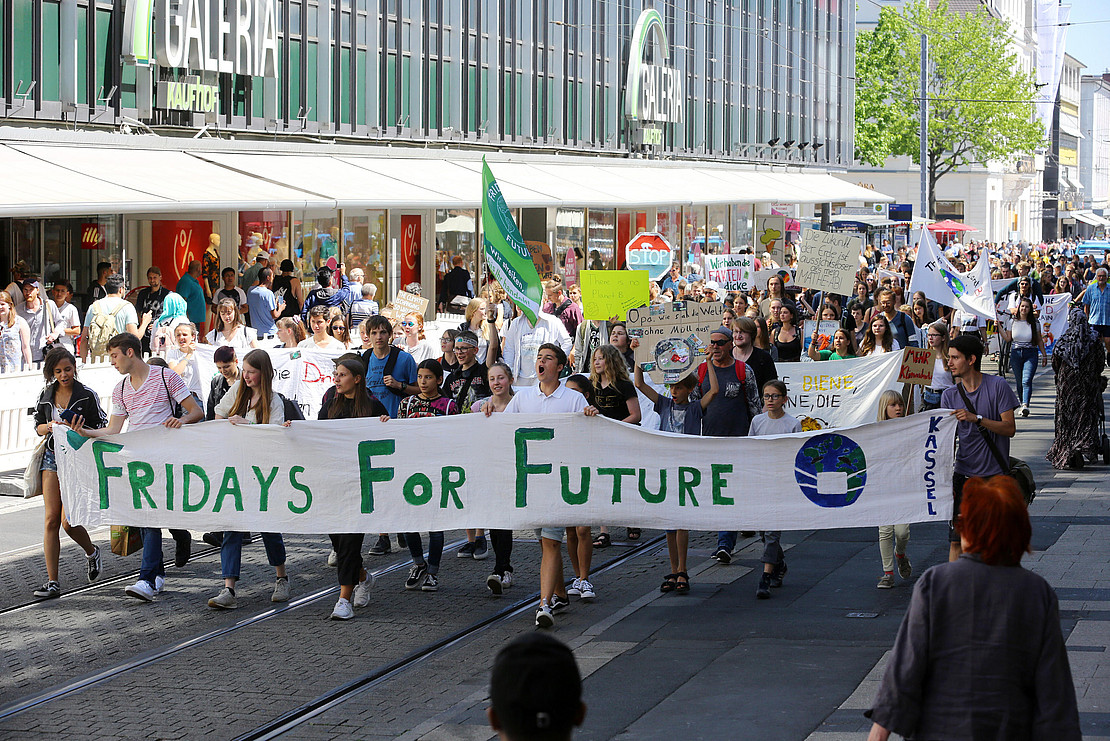This page contains automatically translated content.
"Science must position itself"
 Image: Andreas Fischer.
Image: Andreas Fischer.In March 2019, 300,000 schoolchildren demonstrated for climate protection on the first global protest day of the "Fridays for Future" movement in Germany alone. The consistency with which the young people emphasized their demands caused a stir. They are striking the school, which is supposed to prepare them for their professional and civic future. They question the opportunities that are supposed to be created for them in the process. Global warming, they say, poses a massive threat to these prospects and expectations. The young people are very consistent about this; after all, the school strike can have very unpleasant consequences for individual students.
The strikers argue with good reasons for their actions. Scientifically very well proven tipping points in the climate system are getting closer and closer. There is a danger of irreversibility of global warming and some consequences can already be seen. As early as 1992, the global community decided that sustainable development should ensure that future generations at least have the opportunities for development that current generations claim for themselves. Since that time, there has even been an Article 20a in the German Basic Law that expresses this. The striking young people see that since then, work on changes has been slow, and in some cases there has been considerable regression. This means massive dangers especially for the coming generations and a restriction of their life possibilities. Today's adults are performing enormous displacement feats with regard to climate change, and young people are now taking them to task. They will not be put off and demand political action for effective CO2 reduction.
The students' strikes and demonstrations have a basis that has actually been known for a long time. In the Shell Youth Studies from 2002 to 2015, concern regarding pollution is consistently high among 60 percent of young people. Climate change, which was first addressed in the 2010 study, triggers anxiety among 55 percent of adolescents and young adults, and 76 percent consider it a major or very major problem. Many young people, the youth studies also reveal, are trying to respond to the climate issue with their own behavioral changes. A recent study by the German Federal Ministry for the Environment shows that 83 percent of young people see consumer behavior as the cause of the climate crisis, but 86 percent see the government as having the power to act. The "Fridays for Future" demonstrations therefore have a background in young people's concerns and justified fears for the future. Apparently, it took a person like Greta Thunberg, perhaps as a kind of catalyst, to bring these concerns, along with demands, to the streets.
Education and science are also challenged. It is a matter of content and issues in research and teaching. Climate change has been scientifically proven, and some of the consequences are predictable. Scientific findings must now also have political consequences. Science must take a stand. In Berlin, the entire presidium of the Technical University took part in a "Fridays for Future" demonstration. Humboldt University, under pressure from students, wants to become climate-neutral by 2022. The University of Kassel has strong lines of tradition in the environmental field and approaches to sustainable university policy to which it could very well connect. However, education for sustainable development is by no means widespread in some places. What is missing is an offensive university policy on climate and sustainability issues. A group of "Scientists for Future" is currently being formed at the university. A broad-based movement for emissions reduction and climate neutrality is developing in Kassel's urban society. The University of Kassel is therefore capable of connecting with scientifically sound arguments and can effectively support a necessary departure both internally and externally.
Text: Bernd Overwien